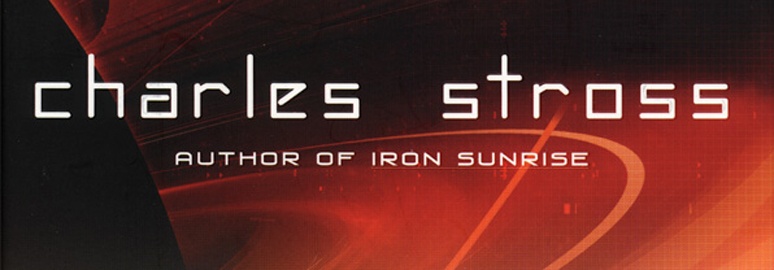I'm almost finished reading my 4th work of Strossian fiction, as the acclaiming critics like to refer to them. Charles Stross, friend of Bruce Sterling, writer of fantastical visions of the future, has been inspiring me lately. You may or may not know this about me, but I'm infatuated with the the future. Reading about the future, seeing sketches of the future, designing the future, contemplating the societal, political, and moral debates that will take place in the future. It's all a large part of me; what I think about, and where I see myself being most valuable to those around me.
Charles Stross and I share this passion. Accelerando, Glass House, The Atrocity Archives, and Singularity Sky; master works of cyber-punk futurist sci-fi all. I'd like to tell you briefly about how Accelerando inspired me. The book starts off in the future, naturally, although not too far into the future that it feels out of reach. People have the internet in their heads, can split their thoughts into as many separate versions of themselves as they want, and can live forever young if they so choose. Granted the immortality part is a bit out there, but the internet in your head...come on, that's not really that hard to believe, is it? This being the future, and there being radically new technologies, the society and government are obviously very different from ours as well. But what really compels the magic of the story is the main character who's business is simply, innovation. In this futuristic economy, seemingly driven by information, he is able to thrive completely off the money grid. Everything he needs - goods, services, everything - he acquires by selling innovation.
Now I'm going to let you marinate on that for one second. I thought this concept to be particularly relevent in today's downtrodden economy and with the current obsession with "innovation". If I could conduct a test to count the frequency of words used in the media, I would bet a heck of alot that the word innovation has skyrocketed in frequency of use over the last 2 years. I went to a conference themed Innovation for Baby Boomers, or something like that, and to nobody' surprise, at least five speakers had actual powerpoint slides with the varied definitions of innovation on them. There's no doubt that some form innovation is fundamental to a thriving economy, I just see the word being thrown around and overdefined to the point of numbness, and it makes me want to rebel sometimes. Or at least not waste time defining what innovation is, or even listening to other people's definitions, but actually spend time innovating instead. No meta about it, pure work.
Anyway, I'll summarize the rest of the story briefly. So this guy goes around trading innovative ideas, business plans, and strategies for success, for everything he needs in life - food, housing, travel, everything. He makes people wildly rich all the while not caring about, or acquiring for that matter, money. Now, with all this talk about saving businesses who would otherwise die off, (having spent their last years putting out crap product that not enough people were marketed into buying) by giving them billions upon billions of dollars, I can't help but think about how future economies will function. What would the world be like if everyone operated on a barter system, for instance? Working for a design consultancy, I can see this as a totally feasible way to do business. Follow along with me here for a minute. Company A comes to us, Company B and asks us to design them Product C. Why not, then, instead of giving us cash, can't they just give us as much of Product C as we need, or maybe extra so that we can turn around and trade them for Product D, which we need in order to make Product E for Company F. You see where I'm going with this.? A real economist would probably tell me I'm crazy or naive for thinking this way and that our world could never function like that. But Charles Stross thinks our world could function like that, and that's why I like him.
